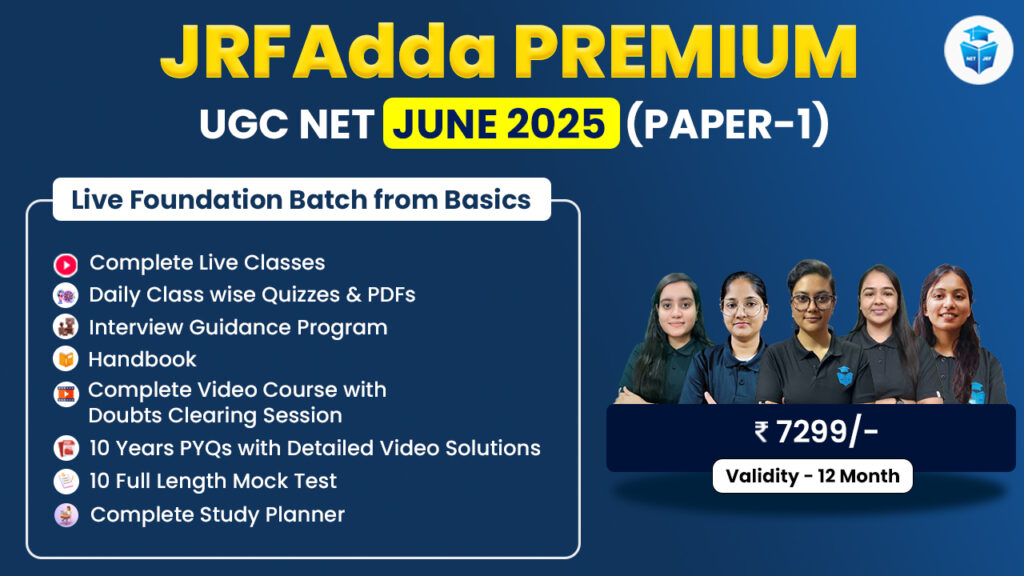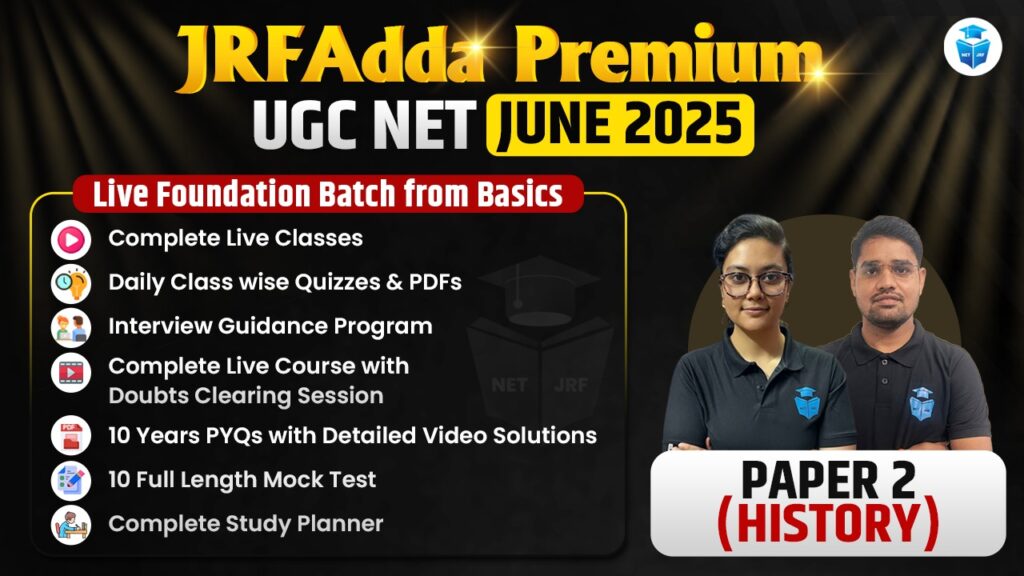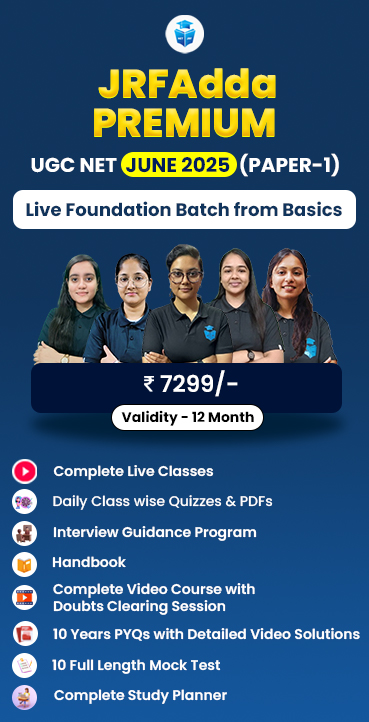Sociology Syllabus UGC NET JRF
The Sociology syllabus is divided into 10 units, covering topics such as sociological theories, research methodology, rural-urban transformations, social stratification, the economy and society, family and kinship systems, and the relationship between science, technology, culture, and the environment. It includes key theories from prominent sociologists like Durkheim, Marx, Weber, and Merton, as well as research methods, data collection, and analysis techniques. The syllabus also addresses changes in social structures, social movements, and emerging issues within various social institutions.UGC NET Sociology Exam Pattern
The table below presents the exam pattern for the UGC NET JRF Exam, specifying the number of questions and marks assigned to each paper. It provides a clear breakdown of the structure of both Paper 1 and Paper 2. The total duration of the exam is 180 minutes (3 hours).| UGC NET JRF PAPER | NUMBER OF QUESTIONS | MARKS |
|---|---|---|
| UGC NET JRF PAPER 1 General paper on teaching and research aptitude | 50 questions | 100 marks |
| UGC NET JRF PAPER 2 Sociology | 100 questions | 200 marks |
| TOTAL | 150 questions | 300 marks |
Sociology Paper 2 Syllabus UGC NET JRF
Sociology Paper 2 of the UGC NET JRF exam, which focuses on the core concepts, theories, and issues in Sociology. It covers a wide range of topics essential for understanding the social structure, institutions, and processes, as well as the relationship between society and various fields such as politics, economy, environment, family, technology, and culture. Unit 1: Sociological Theory- Classical Sociological Traditions
- Emile Durkheim
- Max Weber
- Karl Marx
- Structure- Functionalism and Structuralism
- Bronislaw Malinowski
- A.R. Radcliffe- Brown
- Talcott Parsons
- Robert K. Merton
- Claude Levi Strauss
- Hermeneutic and Interpretative Traditions
- G.H. Mead
- Karl Manheim
- Alfred Schutz
- Harold Garfinkel
- Erving Goffman
- Clifford Geertz
- Postmodernism, Post Structuralism and Post Colonialism
- Edward Said
- Pierre Bourdieu
- Michel Foucault
- Jurgen Habermas
- Anthony Giddens
- Manuel Castells
- Indian Thinkers
- M.K. Gandhi
- B.R. Ambedkar
- Radha Kamal Mukherjee
- G. S. Ghurye
- M.N. Srinivas
- Irawati Karve
Unit 2: Research Methodology and Methods
- Conceptualizing Social Reality
- Philosophy of Science
- Scientific Method and Epistemology in Social Science
- Hermeneutic Traditions
- Objectivity and Reflexivity in Social Science
- Ethics and Politics
- Formulating Research Design
- Reading Social Science Research, Data and Documents
- Induction and Deduction
- Fact, Concept and Theory
- Hypotheses, Research Questions, Objectives
- Quantitative and Qualitative Methods
- Ethnography
- Survey Method
- Historical Method
- Comparative Method
- Techniques
- Sampling
- Questionnaire and Schedule
- Statistical Analysis
- Observation, Interview and Case study
- Interpretation, Data Analysis and Report Writing
Unit 3: Basic Concepts and Institutions
- Sociological Concepts
- Social Structure
- Culture
- Network
- Status and Role
- Identity
- Community
- Diaspora
- Values, Norms and Rules
- Personhood, Habitus and Agency
- Bureaucracy, Power and Authority
- Social Institutions
- Marriage, Family and Kinship
- Economy
- Polity
- Religion
- Education
- Law and Customs
- Social Stratification
- Social Difference, Hierarchy, Inequality and Marginalization
- Caste and Class
- Gender, Sexuality and Disability
- Race, Tribe and Ethnicity
- Social Change and Processes
- Evolution and Diffusion
- Modernization and Development
- Social Transformations and Globalization
- Social Mobility
Unit 4: Rural and Urban Transformations
- Rural and Peasant Society
- Caste-Tribe Settlements
- Agrarian Social Structure and Emergent Class Relations
- Land Ownership and Agrarian Relations
- Decline of Agrarian Economy, De-peasantization and Migration
- Agrarian Unrest and Peasant Movements
- Changing Inter-Community Relations and Violence
- Urban Society
- Urbanism, Urbanity and Urbanization
- Towns, Cities and Mega-Cities
- Industry, Service and Business
- Neighbourhood, Slums and Ethnic Enclaves
- Middle Class and Gated Communities
- Urban Movements and Violence
Unit 5: State, Politics and Development
- Political Processes in India
- Tribe, Nation State and Border
- Bureaucracy
- Governance and Development
- Public Policy: Health, Education and Livelihoods
- Political Culture
- Grass-root Democracy
- Law and Society
- Gender and Development
- Corruption
- Role of International Development Organizations
- Social Movements and Protests
- Political Factions, Pressure Groups
- Movements based on Caste, Ethnicity, Ideology, Gender, Disability, Religion and Region
- Civil Society and Citizenship
- NGOs, Activism and Leadership
- Reservations and Politics
Unit 6: Economy and Society
- Exchange, Gift , Capital, Labour and Market
- Mode of Production Debates
- Property and Property Relations
- State and Market: Welfarism and Neoliberalism
- Models of Economic Development
- Poverty and Exclusion
- Factory and Industry Systems
- Changing Nature of Labour Relations
- Gender and Labour Process
- Business and Family
- Digital Economy, E-Commerce
- Global Business and Corporates
- Tourism
- Consumption
Unit 7: Environment and Society
- Social and Cultural Ecology: Diverse Forms
- Technological Change, Agriculture and Biodiversity
- Indigenous Knowledge Systems and Ethno-Medicine
- Gender and Environment
- Forest Policies, Adivasis and Exclusion
- Ecological Degradation and Migration
- Development, Displacement and Rehabilitation
- Water and Social Exclusion
- Disasters and Community Responses
- Environmental Pollution, Public Health and Disability
- Climate Change and International Policies
- Environmental Movements
Unit 8: Family, Marriage and Kinship
- Theoretical Approaches: Structure-Functionalist, Alliance and Cultural
- Gender Relations and Power Dynamics
- Inheritance, Succession and Authority
- Gender, Sexuality and Reproduction
- Children, Youth and Elderly
- Emotions and Family
- Emergent Forms of Family
- Changing Marriage Practices
- Changing Care and Support Systems
- Family Laws
- Domestic Violence and Crime against Women
- Honour Killing
Unit 9: Science, Technology and Society
- History of Technological Development
- Changing notions of Time and Space
- Flows and Boundaries
- Virtual Community
- Media: Print and Electronic, Visual and Social Media
- E-Governance and Surveillance Society
- Technology and Emerging Political Processes
- State Policy, Digital Divide and Inclusion
- Technology and Changing Family Relations
- Technology and Changing Health Systems
- Food and Technology
- Cyber Crime
Unit 10: Culture and Symbolic Transformations
- Signs and Symbols
- Rituals, Beliefs and Practices
- Changing Material Culture
- Moral Economy
- Education: Formal and Informal
- Religious Organizations, Piety and Spirituality
- Commodification of Rituals
- Communalism and Secularism
- Cultural Identity and Mobilization
- Culture and Politics
- Gender, Body and Culture
- Art and Aesthetics
- Ethics and Morality
- Sports and Culture
- Pilgrimage and Religious Tourism
- Religion and Economy
- Culture and Environment
- New Religious Movements
Preparation Tips Sociology UGC NET JRF Exam
Here are six preparation tips for the Sociology UGC NET JRF Exam:- Understand the Syllabus Thoroughly
- Focus on Core Theories and Thinkers
- Master Research Methodology
- Solve Previous Year Papers
- Stay Updated on Current Sociological Issues
- Use Multiple Resources
Books recommended for Sociology
- “Sociology: Themes and Perspectives” by Haralambos & Holborn A comprehensive book for understanding sociological theories and concepts, including works of major sociologists.
- “Sociology” by Giddens, Duneier, Appelbaum, and Carr This book covers sociological concepts, theories, and contemporary issues. A valuable resource for Paper 2.
- “Sociology: A Guide to the Reference Literature” by Dr. Ram Ahuja A key resource for understanding the important sociological theories and thinkers.
- “UGC NET Sociology Paper 2” by Deepak K. Soni A specialized book tailored to UGC NET JRF exam preparation, covering all Paper 2 topics with a focus on key concepts.
- “Indian Sociology: Themes and Perspectives” by G.S. Ghurye A crucial book for understanding Indian sociological thinkers and concepts, especially for the Indian thinkers’ section in Paper 2.
- “Social Change in Modern India” by M.N. Srinivas Essential for understanding social changes and modernization in India, a vital area in the exam.
- “Sociology of India” by N. Jayaram Helps in understanding Indian society, its structures, and major social issues.
- “Research Methodology in Social Sciences” by C.R. Kothari An important resource for understanding research methods and techniques, which is crucial for Paper 2.
- “Sociological Theory” by George Ritzer Provides a detailed understanding of classical and modern sociological theories, which are essential for the exam.
- “An Introduction to Sociology” by Anthony Giddens
A beginner-friendly book that introduces core sociological concepts and major theorists.
Conclusion
The UGC NET JRF exam in Sociology is a comprehensive assessment that evaluates both theoretical knowledge and practical research skills. The syllabus covers a wide range of topics, including classical sociological theories, research methodology, social institutions, social change, and contemporary issues such as globalization, social inequality, and environmental concerns. Preparation for this exam requires a thorough understanding of key concepts, thinkers, and emerging social trends. By using recommended textbooks, solving previous year papers and practicing time management, candidates can improve their performance and achieve success in the UGC NET JRF Sociology exam.
Sociology Paper 2 Syllabus FAQs
Candidates must have a Master’s degree in Sociology with at least 55% marks (50% for SC/ST/OBC) from a recognized university. They must also be under 30 years of age for the Junior Research Fellowship (JRF) category
Focus on understanding sociological theories, research methodologies, key thinkers, and current social issues. Practice previous year papers, revise regularly, and stay updated with socio-political developments. Refer to standard books and take mock tests.
The UGC NET Sociology syllabus comprises various topics related to sociological theories, research methods, social institutions, social change, and contemporary issues in sociology. It covers the comprehensive study of sociology for the UGC NET exam.
No, there is no negative marking in the UGC NET Sociology exam. Answering all questions confidently is important, but avoid guesswork as unanswered questions are not penalized.
Yes, the UGC NET Sociology syllabus covers contemporary sociological issues such as globalization, social inequality, gender issues, environmental changes, and social movements. It also covers topics like urbanization, political sociology, and the impact of technology on society, highlighting current social challenges and transformations.












